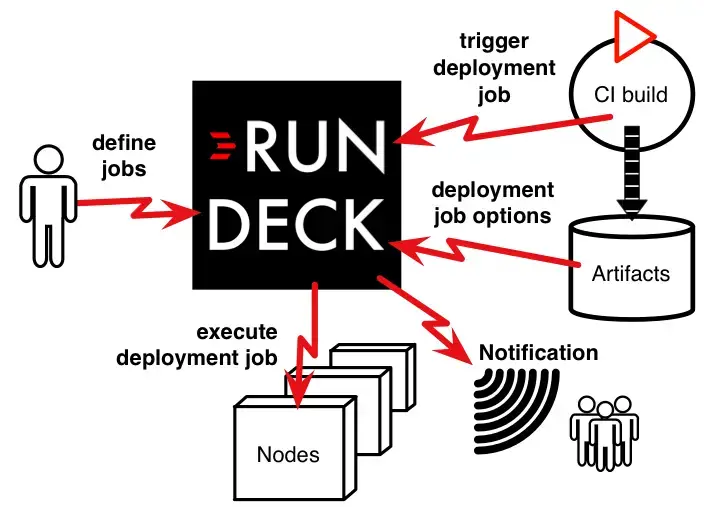Learn how to – Install and configure Rundeck on Ubuntu 18.04 / Debian 9.
Rundeck is an open source automation service that lets you easily run automation tasks across a set of nodes. It comes with a web console, command line tools, and a WebAPI.

In this guide, I’ll take you through the steps to install and configure Rundeck on Ubuntu 18.04 & Debian 9. The same should also work for Ubuntu 16.04 LTS.
Features of Rundeck
- Distributed command execution
- Workflow (including option passing, conditionals, error handling, and multiple workflow strategies)
- Pluggable execution system (SSH and WinRM by default; Powershell available)
- Pluggable resource model (get details of your infrastructure from external systems)
- On-demand (Web GUI, API or CLI) or scheduled job execution
- Secure Key store for passwords and keys
- Role-based access control policy with support for LDAP/ActiveDirectory/SSO
- Access control policy editing/management tools
- History and auditing logs
- Use any scripting language
Step 1: Update your system & Set the hostname
Start your installation by making sure your packages are updated.
sudo apt update sudo apt upgrade -y
After update, set server hostname.
sudo hostnamectl set-hostname rundeck.example.com
Add the hostname and IP address to /etc/hosts
echo "192.168.17.50 rundeck.example.com" | tee -a /etc/hosts
Step 2: Install Java 8 ( SE or OpenJDK)
Rundeck requires Java 8 installed on the host system. You can install Java 8 on your Ubuntu 18.04 / Debian 9 by:
1. Add Java 8 PPA repository
sudo add-apt-repository ppa:webupd8team/java
Press [ENTER] when prompted to add the repository to your system.
2. Install Java 8 on Ubuntu 18.04 / Debian 9
sudo apt install oracle-java8-installer
Press Ok to Agree to Oracle Binary Code License Agreement for the Java SE Platform Products and JavaFX.

Next, Accept Oracle Binary Code license terms by selecting Yes

After the installation is done, confirm the Java version installed:
$ java -version java version "1.8.0_191" Java(TM) SE Runtime Environment (build 1.8.0_191-b12) Java HotSpot(TM) 64-Bit Server VM (build 25.191-b12, mixed mode)
To install OpenJDK 8, just run:
sudo apt install openjdk-8-jdk-headless
Step 3: Install Rundeck on Ubuntu 18.04 / Debian 9
After installing Java 8, proceed to install Rundeck on Ubuntu 18.04 / Debian 9.
Check for the latest release of Rundeck before downloading.
wget https://dl.bintray.com/rundeck/rundeck-deb/rundeck_3.0.22.20190512-1.201905130100_all.deb
Once downloaded, install the package using dpkg command:
$ sudo dpkg -i rundeck*.deb Selecting previously unselected package rundeck. (Reading database ... 105814 files and directories currently installed.) Preparing to unpack rundeck_3.0.22.20190512-1.201905130100_all.deb ... Unpacking rundeck (3.0.22.20190512-1.201905130100) ... Setting up rundeck (3.0.22.20190512-1.201905130100) ... Adding group rundeck....done Adding system user rundeck....done Processing triggers for ureadahead (0.100.0-20) ... Processing triggers for systemd (237-3ubuntu10.3) ...
Step 4: Configure Rundeck
The main configuration file is /etc/rundeck/framework.properties. Edit the file to customize Rundeck
I have modified my Rundeck server connection information to be similar to below:
framework.server.name = rundeck.example.com framework.server.hostname = rundeck.example.com framework.server.port = 4440 framework.server.url = http://192.168.17.50:4440
Also set correct hostname on /etc/rundeck/rundeck-config.properties
$ sudo vim /etc/rundeck/rundeck-config.properties grails.serverURL=http://192.168.17.50:4440
Don’t forget to replace all occurrences of rundeck.example.com & 192.168.17.50 with your correct values for hostname and IP address.
When done with the changes, start rundeckd and set it to start on boot:
sudo systemctl start rundeckd sudo systemctl enable rundeckd
If you have an active ufw firewall, allow port 4440
sudo ufw allow 4440/tcp
To check service status, use:
$ sudo systemctl status rundeckd
* rundeckd.service - LSB: rundeck job automation console
Loaded: loaded (/etc/init.d/rundeckd; generated)
Active: active (running) since Wed 2018-11-14 11:24:45 PST; 19s ago
Docs: man:systemd-sysv-generator(8)
Main PID: 4751 (java)
Tasks: 20 (limit: 2319)
CGroup: /system.slice/rundeckd.service
`-4751 java -Drundeck.jaaslogin=true -Djava.security.auth.login.config=/etc/rundeck/jaas-loginmodule.conf -Dloginmodule.name=RDpropertyfile
Nov 14 11:24:45 rundeck.example.com systemd[1]: Starting LSB: rundeck job automation console...
Nov 14 11:24:45 rundeck.example.com rundeckd[4726]: * Starting rundeckd
Nov 14 11:24:45 rundeck.example.com rundeckd[4726]: ...done.
Nov 14 11:24:45 rundeck.example.com systemd[1]: Started LSB: rundeck job automation console.
Step 5: Access Rundeck UI
Open http://[IP or hostname]:4440/ on your favorite web browser to Login to Rundeck web console.

The default logins are:
Username: admin Password: admin
Changing admin user password by editing the file /etc/rundeck/realm.properties
sudo vim /etc/rundeck/realm.properties
Set like below:
admin:NEW_ADMIN_PASSWORD,user,admin,architect,deploy,build
Restart rundeckd service:
sudo systemctl restart rundeckd
I hope this tutorial was helpful in your journey to install and configure Rundeck on Ubuntu 18.04 / Debian 9.
Leave a Reply
You must be logged in to post a comment.